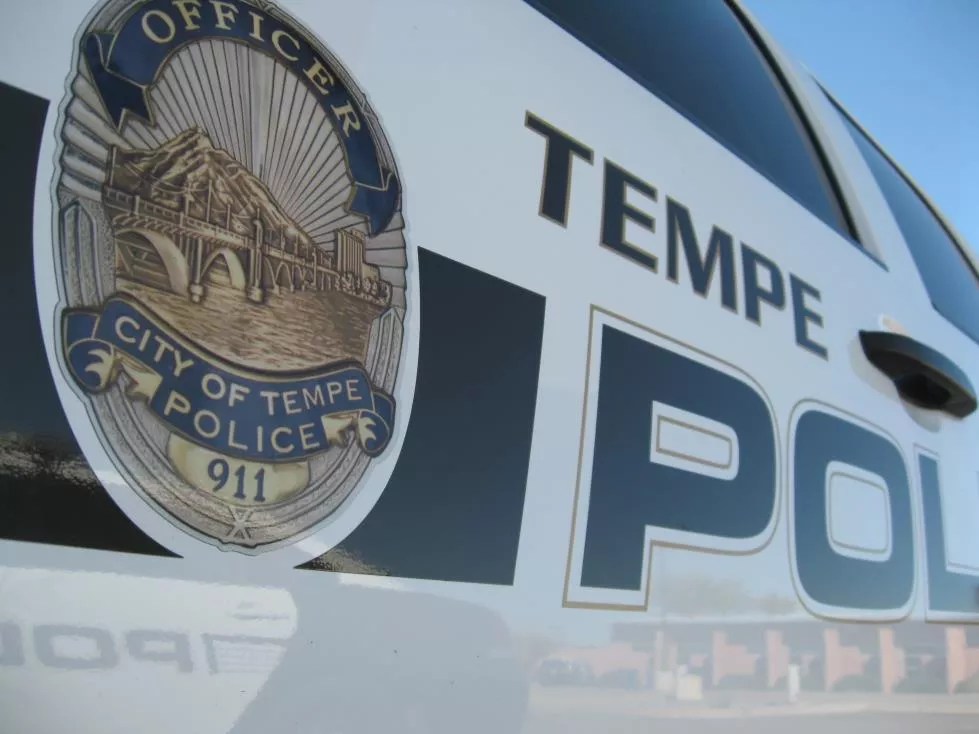
Tempe Police Department

Audio By Carbonatix
Last year, Tempe police officers handcuffed and arrested off-duty Chicago police officer Jalen Woods for allegedly “chirping” his tires while driving on Mill Avenue. The charges were later dropped, but the incident generated a firestorm of criticism of how aggressively Tempe officers treated Woods, who is Black.
Now, nearly a year later, Woods is suing the city in federal court over the incident. In the suit, which was filed Monday, Woods accused the city and specific officers of unlawfully searching his car without probable cause or a warrant, discriminating against him because of his race and retaliating against Woods for speaking to the press and filing a complaint against the city.
Tempe Police Chief Kenneth McCoy and seven other Tempe police officers are named as defendants along with the city.
Body camera footage of Woods’ arrest shows that officers asked him to step out of his vehicle and put him into handcuffs just four seconds later. Police arrested him, as they noted in a report, for using his tires to make a “squealing noise for approximately 1-2 seconds,” while another officer told Woods it was for revving his engine. Woods was jailed overnight and his car, which was a rental, was impounded.
One officer told Woods that he “can’t cut you a ticket” because Woods was from out of state. That’s contradicted by the department’s own policy on traffic stops, which dictates that people are only to be physically arrested if they’re suspected of a felony, a DUI, if they tried to flee from officers or if they refused to sign a traffic citation. None of those conditions applied to Woods.
Woods was cited with violating ARS 28-708(A), which states that “a person shall not drive a vehicle or participate in any manner in a race, speed competition or contest, drag race or acceleration contest, test of physical endurance or exhibition of speed or acceleration or for the purpose of making a speed record on a street or highway.” As Woods’ civil complaint notes, he was not speeding anywhere but was in fact stopped at a red light, which “made actual speeding physically impossible.”
Three weeks later, the charges were dropped by a Tempe prosecutor.
“Any prosecutor in any body who watches the video would see that his driving was fine and he didn’t do anything wrong,” Benjamin Taylor, one of the attorneys representing Woods, told Phoenix New Times on Tuesday. “The officers were pretty much just trying to intimidate him: searching his vehicle without a warrant – which is unlawful – and violating his rights.”
Tempe police spokesperson Heather Lerman said the department will “vigorously defend” the officers and their actions and claimed the lawsuit “completely mischaracterizes the events of that night.”
“The allegation that Jalen Woods was targeted because of his race is categorically false,” Lerman said. “Tempe Police officers enforce the law equally, without regard to race or background. Woods’ arrest was reviewed by our department’s accountability processes, which confirmed our officers acted lawfully and appropriately.”
Lerman did not provide specific details about which details were mischaracterized or answer questions from New Times about specific accusations.

Jalen Woods claims that Tempe police officers were overzealous and aggressive when they arrested him in August 2024.
City of Tempe
Woods’ arrest
According to Woods’ complaint, Tempe officers adopted an aggressive approach from the very beginning of their interaction with him on Aug. 24, 2024.
After seeing Woods driving, Tempe bicycle officers Daniel East and Anibal Espinoza caught up to him while he was stopped at a red light on Mill Avenue. They asked for Woods’ ID, which he provided. They then asked him to pull over on Fifth Street, and he complied.
Woods initially rebuffed an order from East to step out of the vehicle – the lawsuit notes there was heavy traffic on the street and Woods feared for his safety – but he exited after East threatened he would “make” him get out. He was immediately placed in handcuffs, walked to the sidewalk and forced to sit down on the curb.
The lawsuit claims – and video suggests – that Woods cooperated with police, even as he expressed frustration about the situation. Still, Espinoza asked, “Why are you being so difficult?” and told him, “You should know better,” while holding up Woods’ Chicago police ID. The lawsuit alleges that Tempe officer Mark Regester, who responded to the scene after the initial stop, threatened Woods with job consequences.
“You understand we have discretion here, right?” Regester said, per the suit. “You get placed under arrest and you’re going to lose your fucking job, dude.”
The officers then made it clear they wanted to search the vehicle. Woods declined to give his permission. The lawsuit claims the officers decided to tow and impound the vehicle in order to facilitate an “inventory search,” citing state law as a justification.
However, Arizona law states that towing is not required except in specific circumstances, like if the officer believes other people are at risk of “serious bodily injury” or the person is arrested for a DUI. The law also states that if there is another person in the car – there was in Woods’ case – then the car should not be towed unless the other person is under the influence or doesn’t have a driver’s license. It is not clear why Woods’ passenger, who is not identified in the lawsuit, wasn’t allowed to leave with the car.
The towing resulted in “significant additional expense to Mr. Woods,” the lawsuit says, though Taylor said he would need to check with Woods to know how much. The lawsuit claims Woods’ car was searched after it was impounded but that police “found nothing unlawful.”
While in jail, Woods claims, he requested medical attention and told officers that he was having difficulty breathing and needed to go to the hospital, but no medical attention was provided. After he was released, the suit says, he needed medical treatment for a bacterial infection he contracted in jail due to unsanitary conditions.
He also suffered consequences at work as a result of the arrest. “This was the first time in his life being arrested and placed in handcuffs and the arrest required him to be placed on administrative leave with his employer, causing additional humiliation and damages,” the lawsuit says.

Tempe Police Chief Kenneth McCoy
Tempe Police Department
The fallout
Tempe prosecutors dismissed the charge against Woods on Sept. 13, 2024. However, his suit says, that was not the end of his entanglement with Tempe police.
On Jan. 13 of this year, Woods served Tempe with a notice of claim, which is a precursor to a lawsuit. Within 24 hours, his lawsuit says, the Tempe Police Department “had filed or caused to be filed an internal complaint” with the Chicago Police Department against Woods. The internal complaint “falsely suggest(ed) that Mr. Woods had used his status as a police officer for personal gain,” Woods’ suit says. The lawsuit claims that McCoy, the Tempe police chief, would have had to sign off on filing the complaint.
Lerman did not provide an explanation for the timing of the complaint sent to Chicago police, the details of which New Times could not confirm. Woods’ lawsuit says he invoked his status as a Chicago police officer only to ensure he would be treated courteously.
Woods is seeking lost wages for having to go on leave from his job in Chicago, along with other damages. His suit accuses Tempe police of racial discrimination, retaliation, false arrest, illegal search and seizure and defamation, among other allegations.
Taylor said, and the lawsuit notes, that Woods is not the only person who has been wrongly harassed by the department’s cops. Taylor cited a 2015 incident in which a Tempe police officer was disciplined for taking the phone of a man who was filming her. Taylor also said his law firm gets many calls from people saying police have harassed them on Mill Avenue.
“The City of Tempe Police Department has a history of pulling over people for no reason – especially on Mill Avenue,” Taylor said. “They have a pattern of practice of violating the rights of people who are doing nothing wrong.”
Pastor Andre Miller, vice president of Arizona’s NAACP chapter, told ABC15 in February that he was worried about officers making laws up out of thin air. “We have officers misapplying statute. We have officers stating things that are supposed laws that are not,” Miller said. “These are the people that police us and have control over our freedoms.” Miller declined to comment on the lawsuit to New Times.
The fallout from Woods’ arrest has been a headache for Tempe and its chief. Tempe Police Commander Rashidi Johnson – a Black man – was placed in charge of investigating the incident, though he questioned why he was assigned such a role. The department then suspended Johnson, leading him to file a complaint with the Arizona Attorney General in February.
On Aug. 5, Johnson and his attorney, Larry Henke, filed a complaint with the Arizona Department of Public Safety alleging that McCoy consistently and improperly provided top city officials Rosa Inchausti and Greg Ruiz with information from the Arizona Criminal Justice Information System so they could target the homeless and advocates feeding the homeless. Tempe and McCoy have flatly and fervently denied the allegations.